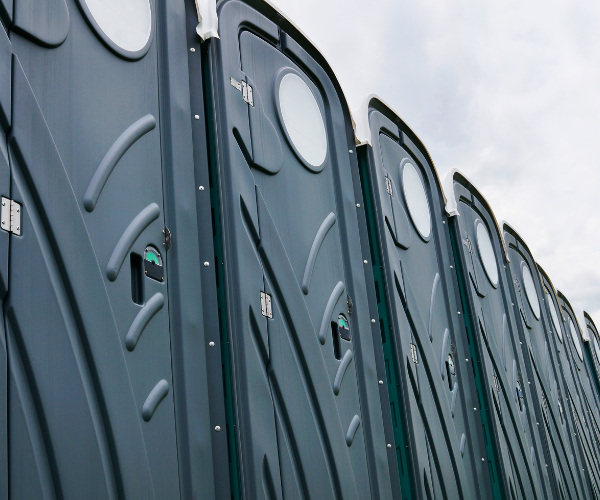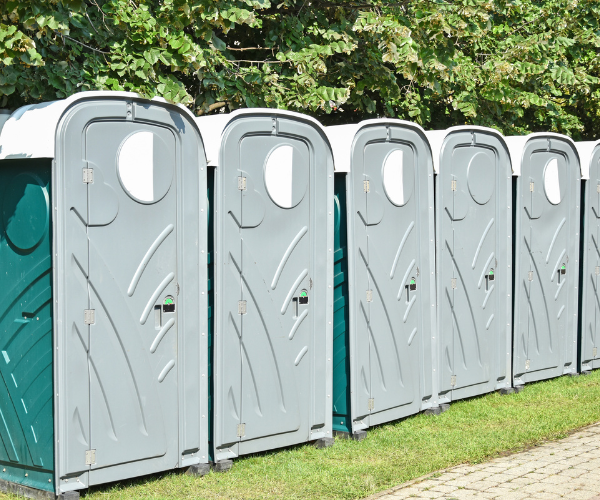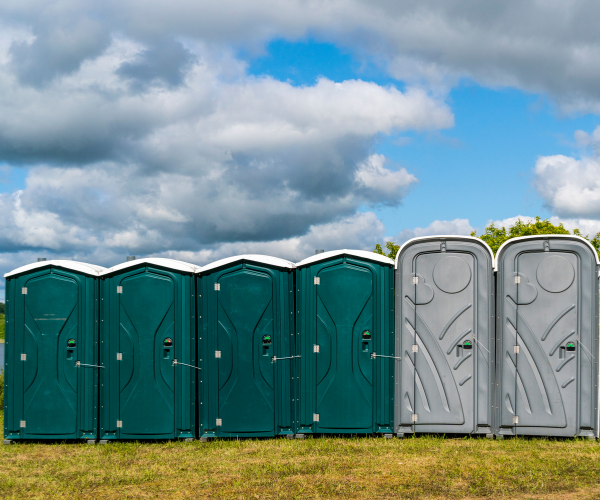Using a portable toilet offers several eco-friendly advantages, making them a smart choice for environmentally conscious organizers and site managers. Firstly, portable toilets are remarkable water savers. Traditional flush toilets can use up to 6 gallons of water per flush, but portable toilets typically operate with minimal water usage or completely waterless systems, significantly reducing water waste. By reducing water usage, these sanitation options also alleviate the burden on local water treatment facilities, especially in areas that face water scarcity. Secondly, modern portable toilets are designed to minimize environmental footprint through effective waste treatment. They use chemicals that break down waste efficiently, ensuring clean and safe disposal without causing harm to the environment. This is crucial for maintaining the ecological balance, particularly in sensitive natural areas. Furthermore, the waste is often treated off-site in facilities specifically designed to handle such materials, reducing the risk of groundwater contamination. Portable toilets also help preserve the natural state of outdoor locations by minimizing the need for construction and plumbing typically associated with traditional restroom facilities. This is particularly beneficial in places where the landscape should remain undisturbed, like parks, historic sites, and certain event venues. By setting up easily and being removed with minimal impact, portable toilets provide a non-intrusive solution. Additionally, many companies have taken steps to manufacture portable toilets using recycled and eco-friendly materials, further lessening the overall environmental impact. These constructions ensure sustainability right from production through to usage and disposal. These toilets are frequently built from recyclable plastics and components, ensuring they contribute to circular economy initiatives. In choosing portable toilets, not only do you benefit from convenience and cost-effectiveness, but you also make a conscious decision to support a greener approach to sanitation. By integrating sustainable solutions into your event or project planning, you contribute positively to environmental conservation efforts. More importantly, promoting these choices reflects a commitment to sustainability that can influence and educate attendees, reinforcing a shared responsibility towards protecting our planet.

Portable Toilet Rentals in Lincoln County, North Carolina
Call today for a free quote (336) 980-2028
Portable Toilet
Fast, Easy, & 100% Free To Get Started
Over 30 Years Of Experience
With over 30 years of experience, A Sani-Can is deeply rooted in the Lincoln County community. Our commitment to quality and customer satisfaction has made us a trusted name in portable sanitation.
Excellence in Service
A Sani-Can excels in delivering top-tier service, ensuring clients experience clean and well-maintained portable sanitation solutions. Our commitment to excellence truly sets us apart.
Prompt Delivery Guaranteed
We ensure rapid delivery of all portable toilet orders, guaranteeing you have the facilities when you need them. Rely on us for prompt and efficient service every time.
Reliable Portable Toilet Solutions in Lincoln County
Call for a Free Quote Today
(336) 980-2028
In Lincoln County, A Sani-Can stands as a beacon of quality in portable sanitation services. As a locally owned business, we're proud to deliver dependable and reliable solutions tailored to our community's needs. Our services cover everything from construction sites to grand weddings, ensuring every event, big or small, benefits from our unwavering commitment to cleanliness and service excellence. We cover Lincoln County and its neighboring areas, so whether you're hosting a festival or a backyard party, A Sani-Can's portable toilets are the go-to choice. Our team ensures the highest hygiene standards with every unit, offering peace of mind to our clients. Let us provide you with top-tier service that has made us a household name in the area.


Our standard porta john rental units are durable and reliable for any commercial build site, housing development, public works project, or remodel job.Features include dome lighting, grated floors, and an “In-Use” locking mechanism for privacy and comfort. Regularly maintained, inspected, and cleaned by FusionSite at your location.

Developed as an alternative to full ADA-compliant restrooms, the Liberty is a spacious, wheelchair-accessible unit that can also be promoted as a family-sized restroom. Includes a patented flat-floor system for easy wheelchair access and maneuverability.Handrails, paper holder, and rotary latch are designed for simple, intuitive end-user operation.

Portable hand washing stations are essential for keeping your work site sanitary and clean. Features hands-free foot pumps, liquid soap, and paper towels.Perfect for job sites without water hookups, these units can handle hundreds of washes between services.
We Proudly Serve
Standard Portable Toilets
Standard Portable Toilets by A Sani-Can provide efficient and hygienic solutions for events and sites in North Carolina.
High Rise Portable Toilets
High Rise Portable Toilets by A Sani-Can offer convenience and accessibility solutions for construction projects in Lincoln County.
Restroom Trailers
Restroom Trailers by A Sani-Can bring luxury and comfort to both large and small events in Lincoln County.
Roll off Dumpsters
Roll off Dumpsters from A Sani-Can ensure waste management efficiency for a variety of projects in Lincoln County.
Septic Tank Cleaning
Septic Tank Cleaning by A Sani-Can offers thorough and efficient cleaning services throughout North Carolina.
Grease Trap Cleaning
Grease Trap Cleaning by A Sani-Can ensures cleanliness and efficiency in Lincoln County, North Carolina.
Fencing & Barricades
Fencing & Barricades by A Sani-Can provide secure and reliable solutions for any event in North Carolina.
Residential Storage
Residential Storage by A Sani-Can offers safe and reliable storage solutions for Lincoln County residents.
Lincoln County Portable Toilet and Sanitation Solutions
Getting a quote for portable toilet rental has never been easier. A Sani-Can offers a streamlined quoting and delivery process designed for convenience and efficiency. Simply fill out the form located at the top or bottom of our page, which requires basic details like your name, phone number, and email, and hit submit. Our knowledgeable team will promptly reach out with a competitive quote tailored to your needs. We understand the importance of prompt service, especially when dealing with event or construction timelines, which is why we prioritize swift deliveries to ensure your facilities are in place and fully operational when needed. Whether you're planning a large festival or a smaller gathering, we make it easy to secure the necessary rentals with minimal hassle. Our comprehensive services are not only convenient but also ensure the highest standards in sanitation and reliability. Trust A Sani-Can to deliver portable toilet solutions that meet your requirements seamlessly, every time.

Lincoln County Charm: Nestled in the scenic allure of Lincoln County, our portable toilets are designed to blend seamlessly with any outdoor event. Whether you're organizing the bustling Denver Days Festival or a cozy family reunion at Betty G. Ross Park, our units provide the perfect solution for clean and reliable sanitation services. Embracing Local Events: Lincoln County is renowned for its vibrant community events and breathtaking natural attractions like Lake Norman. Trust A Sani-Can to support these occasions with top-notch portable toilet services that enhance guest experience and comfort. A Natural Fit: With our keen focus on maintaining the area's natural beauty, our portable toilets offer minimal disruption while ensuring maximum convenience. Choose us for your next event and experience hassle-free service that complements Lincoln's unique charm.
Your Best Choice in Lincoln County: As a leading provider of portable toilet services, A Sani-Can has deep roots in Lincoln County, offering unmatched quality and exceptional customer service. Our dedication to the community and commitment to excellence set us apart. Community Trust: Built on a foundation of trust and reliability, A Sani-Can delivers a personalized service experience for each client. Whether it's a large event or a small gathering, we tailor our solutions to meet your specific needs.
Swift and Reliable Service: At A Sani-Can, we excel in promptly delivering portable toilets. Our team responds quickly to meet your needs, ensuring facilities are ready exactly when you require them. Reliability You Can Count On: With a multitude of satisfied clients, we have built a reputation for promptness and efficiency. This provides you peace of mind, enabling you to concentrate on the successful execution of your event.
Discover Our Portable Toilets in Lincoln County
Renting a portable toilet in Lincoln County with A Sani-Can is a straightforward process designed for ease and efficiency, ensuring you have one less thing to worry about during your event planning or construction project. Begin by visiting our website, where you will find convenient forms located at the top and bottom of each page; these forms are essential tools in getting a quote tailored to your specific needs quickly and accurately. Just click on the 'Get A Quote' buttons placed strategically throughout our site for easy access. Our form will ask for some basic information, including your first name, last name, phone number, and email address. By gathering these details, we can provide personalized service and communication that meets your unique requirements. Once submitted, one of our friendly and knowledgeable staff members will promptly reach out to discuss your needs in further detail, enabling us to provide you with an accurate and competitive quote. Our commitment is to ensure the highest level of service, making the process hassle-free for our clients. Whether it's a single unit for a backyard party or multiple facilities for a large event or site, we endeavor to accommodate all our customers' requests with expertise and efficiency. A Sani-Can prides itself on not only offering a wide range of units—from standard portable toilets to luxury restroom trailers—but also ensuring the entire rental process is seamless and straightforward. This approach allows you to focus on other important aspects of your event or construction project, confident that your sanitation needs are thoroughly taken care of. Our dedicated team provides support at every step, from the initial quote request through to delivery and maintenance during the rental period, ensuring a smooth experience from start to finish. By choosing A Sani-Can, you can be assured of receiving high-quality, clean, and reliable sanitation services that cater specifically to the Lincoln County area.
The delivery timeframe for portable toilet orders with A Sani-Can is designed to be as prompt and convenient as possible, ensuring that our clients receive their sanitation units exactly when they need them. When you place an order with us, we typically work to have your units delivered within 24 to 48 hours. However, this timeframe can vary based on the specific needs of your project or event and the availability of specific units. In most cases, our team coordinates with you to deliver the units at a time that aligns perfectly with your schedule. For larger events or projects that require an extensive number of facilities, we recommend reaching out ahead of your desired delivery date. This planning allows us to guarantee the best options and service for your requirements. Our logistics team is highly experienced in managing tight schedules and challenging site conditions, ensuring that every delivery is smooth and punctual. A Sani-Can's commitment to customer satisfaction means our delivery trucks are always ready, and our drivers are well-versed in navigating to even the most complex of locations. For last-minute requests or emergency situations, we always strive to accommodate and assist where possible, often achieving remarkably fast turnaround times because of our dedicated and flexible approach. Regular communication ensures that you are kept informed and confidently assured of your portable toilet arrangements. With our extensive service areas, spanning Lincoln County and the surrounding regions, choosing A Sani-Can means you are partnering with a dependable provider recognized for timely and efficient service. This dedication to prompt delivery, paired with our high-quality, clean, and well-maintained units, guarantees that your sanitation needs are seamlessly met.
Yes, A Sani-Can is more than capable of servicing events and construction projects of various sizes and types. We pride ourselves on offering comprehensive sanitation solutions that can be tailored to suit everything from festivals and sporting events to weddings and corporate functions. Our range of services includes an array of facilities such as luxury restroom trailers, which provide a high level of comfort and luxury for special occasions, and practical porta potties suitable for bustling outdoor events and construction sites. To meet the diverse needs of different events, we also offer a selection of roll-off dumpsters for convenient waste disposal, as well as fencing and barricades to ensure crowd control and site security. For those looking for additional facilities, we offer portable sinks and hand sanitizing stations, promoting hygiene and ensuring guests or site workers have everything they need on hand. Clients can also request holding tanks for longer events where additional waste storage capacity might be needed, as well as ADA-compliant units, ensuring that our services are inclusive and accessible to all guests. Regardless of the size or nature of your event or construction project, A Sani-Can has the flexibility and resources to accommodate your requests with efficiency and professionalism. A Sani-Can is committed to delivering clean, reliable, and high-quality portable sanitation services that enhance the experience of any event or construction environment. Our customer-oriented approach ensures that you receive not only the facilities you require but also the exceptional level of service that has made us a trusted partner throughout Lincoln County.

